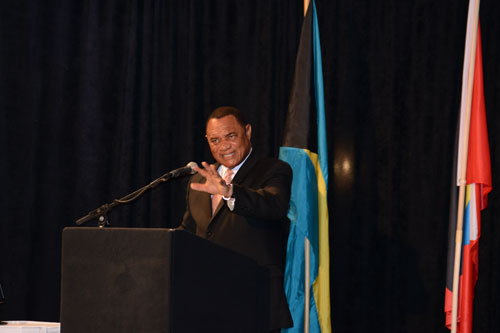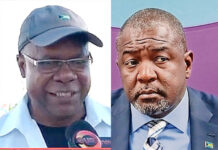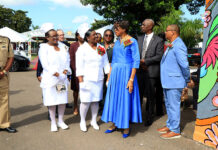
Port of Spain, TRINIDAD & TOBAGO – Remarks by Rt. Hon. Perry Christie, MP, Prime Minister of the Commonwealth of The Bahamas to the Caricom Heads of Government in Port Of Spain, Trinidad and Tobago. Delivered on 3rd July 2013 at the Diplomat Center, Port of Spain:
Mr. President, His Excellency Anthony Carmona, Madame Prime Minister, the Honourable Kamla Persad-Bissessar, Prime Minister of the Republic of Trinidad and Tobago and Chairman of The Conference of Heads of Government of the Caribbean Community,
Outgoing Chairman, His Excellency Mr. Michel Martelly, President of The Republic of Haiti,
Colleagues Heads of Government
Ambassador Irwin LaRocque, Secretary-General of the Caribbean Community,
Members of the Cabinet and other Ministers of the governments of Trinidad and Tobago,
Delegates and Specially Invited Guests
Brothers and sisters of the Caribbean Community,
Good Evening.
Madame Chairman,
I am pleased to be here in Trinidad and Tobago. This is my third visit this year. It is a delight to be here once more. I must say however, well before this year I was familiar with Trinidad. I spent many of my early years as a public figure visiting your fine country and enjoying the people and of course, Carnival.
Let me say to you Mr. President and my colleague Prime Minister thank you for the kind hospitality which you have offered to me and my delegation on this visit and the previous visits that I made to your beautiful country.
This visit and conference mark my return formally to the Caricom arena as Prime Minister. I served in my first term as Prime Minister from 2002 to 2007. It was the policy of my government then to engage Caricom and its organs. I thought then it was the right decision for The Bahamas and for our region. I return to this forum today to re-affirm that The Bahamas is back for business in the forum to which it belongs.
This is particularly important I believe on the occasion of the 40th anniversary of the signing of the Treaty of Chaguaramas, the founding instrument of Caricom. Trinidad is the place of the birth of the modern Caribbean project. I say congratulations to Trinidad for being our hosts but congratulations are due to the leaders of the day in 1973 who saw in their wisdom that there was a need to deepen and strengthen the relations between our nations, and to foster a functional mechanism for our greater cooperation and economic development. I pay tribute to all of those founding fathers today.
I wish in particular to pay tribute to our founding Prime Minister the late Sir Lynden Pindling who was a great believer in the Caricom project. He brought The Bahamas into Caricom shortly after our nation’s independence. In the Caribbean therefore, he ranks in the same generation as Manley, Williams, Barrow, Bird, and Burnham. It was he who later signed the Grand Anse declaration in 1989 deepening the Caricom project. We stand today on those shoulders, the shoulders of giants.
The Bahamas is doubly proud to join you on this occasion because next week, we will mark forty years as a nation, having achieved our national independence on 10th July 1973. Our theme for our 40th anniversary is “A bridge to the future…a Journey continues.”
I wish to use this occasion to again invite all of you to The Bahamas, and if per chance your schedule allows, we would be delighted to have you share in the marking of this important milestone in the history of our nation.
I extend warm congratulations to my Honourable friends Keith Mitchell, the Prime Minister of Grenada and Freundel Stuart, the Prime Minister of Barbados for their re-election to office as the heads of their respective governments.
The Caricom region has had an interesting history in democracy. The wonder of democracy is that in a minute you will see us and in another moment may not see us. As the Bible says: in a moment, in the twinkling of an eye, we shall be changed.
When I lost office in 2007, it was at the back end of a trend which began with changes in government in St. Lucia, in Barbados, In Jamaica, in Grenada and in Trinidad and Tobago. Now through the mysteries and I would argue the goodness of democracy many of us are back to serve our nations: a little older, and I daresay a little wiser. For those who are spiritual, I would rely on several versus from the book of Ephesians: Put on the full armor of God so when the day of testing comes you are able to stand your ground and when you’ve done your best to stand, still stand, with the belt of truth wrapped around your waist and your feet made ready by the gospel of peace, I SKIP A FEW LINES TO THE MAIN THRUST, THE FINAL VERSE, that says, and the shield of faith that will protect you against the fiery darts and arrows that will be thrown against you.
For all of those reasons, I am here today, proud to stand amongst you once more.
In my opening statement I described Caricom as a project. I go further now and say it is a work in progress, a continuing conversation around common themes and experiences from which we all benefit.
In recent years, there has been some marked and open impatience with the pace of the Caricom project, but I am pleased to recognize that the journey continues.
It is often said that if Caricom did not exist it would have to be invented.
I believe that. The Bahamas subscribes to that view. It is the view that as small nations we benefit from sharing our common and not so common experiences. It is a wonderful experience and a great comfort to know that at a moment’s notice if there is an issue or problem which arises in The Bahamas, the assistance is only a phone call away, and a short distance away by air and sea.
We should take pride in what we have accomplished with the Caricom project. We ought to see the glass as half full and not half empty. We should take pride that we have managed to stay together and work functionally with one another, recognizing that each country may move at a different pace towards the larger goals of closer and more beneficial levels of cooperation. We ought to readily admit that the functional cooperation works well.
It is easy to be over ambitious for the Caricom project, to look at other movements and think to ourselves that we could be just like them. Perhaps we can. However, our people can only move at the pace which is comfortable to them. We as leaders can speak to the larger themes, but the practicalities of life are what they are.
The functional cooperation can be seen in the many pan Caribbean institutions which are allied to the Caricom project. Amongst them are the University of West Indies, the Caribbean Electricity Corporations (Carilec), the Caricom Emergency Disaster Management Agency (CDERA), CrossQ, the association of Standards Bureaus; the Council of Legal Education; the Caribbean Medical Council, Pan Cap which fights HIV and AIDS across the region; the Cariforum which deals with trade relations with the European Union; the Caribbean Tourism Organization, and the Caribbean Hotels Association. These are all areas of successful functional cooperation that work effectively for our countries.
The Bahamas therefore is proud to be a part of this Caricom project, of this continuing conversation and pledges to help to make this work in progress a continuing success.
Recently, The Bahamas led a special fact finding mission to the Associate State of our Community in the Turks and Caicos Islands. This territory is special to us because they are our kith and kin. Indeed, it is often said that there are more people of Turks and Caicos Islands descent in The Bahamas, than there are in the Turks and Caicos Islands. The fact is however that we share a special concern about them and have encouraged their democracy and self-determination.
I say this in the context of the wider theme that I have been discussing, that of participation in the wider Caricom project. We have encouraged that associated state now that they have a modicum of say over their own governance and affairs, to deepen their participation with us and in the Caricom project. We think that this will inure to the greater benefit of the people of that territory.
As I speak however, I do not want to paint a picture that is so rosy that we sit back and pat ourselves on the back. That is not my purpose at all. We must all admit to the fact that there are real challenges which face us. Amongst them are: The challenges of transitioning from an agrarian economy to a service economy; the challenges of unemployment and under employment, particularly with our youth; the challenge of crime and violence; the disequilibrium between the development of young males and young females in the society; the undermining of our economies by heavy debt burdens while at the same time developed economies impose unfunded mandates on our countries; the challenge of educating our young people; the challenge of climate change and coastal erosion; indeed the very challenge of survival. In fact, the challenge to the current leadership of the region is to guarantee to the future generations of our citizens that they would have an opportunity to see and feel and enjoy the natural assets and romance of our countries in the same way we do today.
The Caricom project is the vehicle to help solve these problems and overcome these challenges.
Often we are dismissed as a talking shop. I am reminded however that the Caribbean culture or civilization as my friend Dr. Ralph Gonsalves would say is replete with talking. In each of our societies men and women meet in places large and small and they talk and discuss the day’s news and events and try to solve the world’s problems by talking. So talking is a start. It is certainly preferable to using bullets.
In my country which stretches a distance equivalent to the length of the entire southern Caribbean, we have to replicate our efforts over and over. Where you may have one airport to build, we have to build 25. Where you have one hospital to build we have to build 25 and so on. In each of those islands if you visit us on a Saturday morning, our people are sitting in little restaurants with their meal of boiled fish and Johnny cake and talking about the problems of the day. The talking is therapeutic, but it also helps us to see our way more clearly to solving the problems. So the fact that we talk in Caricom is nothing unusual in the region. We have done more than talk, however. We have joined together and made it known to the world the unfairness of the measure of GDP per capita as a means for judging whether their development assistance is needed or not.
We have been able to lure new investment to the Caribbean away from our traditional partners.
Our security agenda and the fight against crime are unremitting, and we are engaged actively in seeking solutions pan Caribbean wide to these thorny problems. The Bahamas is pleased to recall the lobbying which took place in the United Nations by regional nations that led to the signing of the Small Arms Treaty on 3rd June. It was a stellar achievement and the Caricom region led the way in the world for this treaty to come into force. This was but a small step in seeking to fight the violence from guns, which plagues all of our societies.
Shortly after I won office last year I received a congratulatory call from the then Secretary of State for the United States Hilary Clinton. I explained to her what I believed was the most constructive role that the United States could play in The Bahamas and in the region. I said that the contribution should aim at stopping the violence and crime and enhancing the security of our countries.
The United States has a stake in this because it also impacts the security of the United States. There are many people who are trying to get into the United States, thereby bringing to the forefront the issue of trafficking in persons; the issue of the United States being the source of the guns and heavy weaponry that find their way to our countries; and the source of those who have committed offenses in the U.S. and are deported back to the region. I said to the Secretary of State, that the US must pay closer attention to the concerns and challenges of limited resources of countries in the region in fighting the scourge of crime. I argued that the United States should dedicate more resources to enable the region to more effectively meet the disastrous consequences of crime. That was my message to her and my message much later to the U.S. Attorney General Eric Holder whom we met in Port au Prince Haiti in February of this year.
Since that time, a delegation of American officials has visited our country and we are now working very closely on several initiatives to fight crime and to enhance security. But we must do more to impress upon our friends and neighbors that stability of our democracies and the stability of our countries are directly connected to the extent to which there can be a greater sharing in the strategies employed to address these challenges. More must be done to help with development; to strengthen the sharing of intelligence and funding resources with respect to deportees coming back to the region; more must be done to help in the education of our populations. Indeed isn’t it a fundamental irony that when we are most challenged for resources, when our traditional partners are cutting back on funding for our countries, our young people who gain their education at public expense in the region are more and more moving to the United States and to Canada. So we are paying for the expertise which enriches their societies. It is therefore incumbent upon us to make the case that the developed countries have an obligation, dare I say, a moral obligation in all of the circumstances, to give back to our societies.
I use this opportunity again to say, that the developed world, the United States and Canada, have a stake in the success of the countries of the region.
So my friends it is good to be back here in this forum. I believe that we have much work to do. As the poet says, we have miles to go before we sleep. Our ancestors would not smile upon us if this generation of leaders fails in the task of ensuring that this wonderful Caricom project succeeds. Failure as they say is not a possibility.
I now turn to an issue that is near and dear to my heart. That is, the request by the President of Haiti for a proposal for a High-Level Meeting on Persons with Disabilities and Special needs. I commiserate with the peoples of Haiti regarding the fact that arising from its 2010 earthquake, a significant number of persons was injured and now has disabilities. But I would also want to speak to the issue of those children who are impaired at birth with some form of disability, and whose parents are too often without the help and even the advice they desperately require. Such children have a fundamental right to an equitable share in the resources of their country. Their plight is too often ignored and insufficiently resourced. In The Bahamas we have just agreed to make a number of major interventions for both children and adults towards enabling those who are affected by disability and their families to have the necessary assistance.
Mr. President, Madame Chair, Colleague Prime Ministers, ladies and gentlemen let us not forget that we live in a region where our differences to the rest of the world represent untold wealth and should invariably be the foundation of our marketing efforts in the region. Our history as it manifests itself in our museums and historical artifacts and the story they tell, our land, our islands, our flora and fauna, our sun, seas and marine life, our eco diversity, our culture and music and most importantly our most important asset OUR PEOPLE must necessarily enable us to face our future with confidence and the assurance that there will be a better tomorrow.
I thank you for your kind attention once again for your welcome and I look forward to working with my colleagues to make sure that the Caricom project succeeds.
If I may borrow a quote from the former Prime Minister of Singapore, Lee Kuan Yew…”Public order, personal security, economic and social progress and prosperity are not the natural order of things.” In short, things will not resolve themselves if left alone, and so we need good governance, technical and administrative capacity, and social consensus and accountability to effect change and achieve success.”
END.







